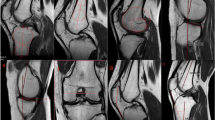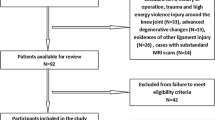Abstract
Purpose
Anterior cruciate ligament (ACL) injuries in siblings are commonly observed in the clinic. One, possibly genetic, factor contributing to the pathogenesis of sibling injuries may be narrow intercondylar notches, which are well recognized as predisposing to ACL injury. This study aimed primarily to: (1) assess the incidence of ACL injuries in siblings within an existing study cohort, (2) compare intercondylar notch width size in injured compared to matched uninjured control siblings and (3) compare the number of injured versus control sibling pairs sharing a narrow notch.
Methods
Twenty-four ACL-injured siblings from 10 families were matched for age, gender, family composition and sports activity, with 24 uninjured siblings from another 10 families. Intercondylar radiographs were taken to calculate anterior and posterior notch width indices (NWI). Notch size and the number of narrow notches in sibling pairs were compared between groups.
Results
Thirteen of 72 ACL-study participants had siblings with torn ACLs. Mean anterior NWI was 0.18 and 0.24 (p < 0.001), and mean posterior NWI was 0.26 and 0.3 (p = 0.006) for injured and uninjured siblings, respectively. Sixty percent of injured sibling pairs shared a narrow notch, while no uninjured sibling pairs did so (p = 0.003).
Conclusion
This study showed that siblings (and often sibling pairs) with injuries do have significantly narrower notches than those without. This could partly explain the prevalence of ACL injuries in siblings. To reduce ACL-injury rates, we advise that siblings of ACL-injured athletes with narrow notches, be radiologically screened, and if necessary, cautioned and counselled regarding preventative training.
Level of evidence
Case–control study, Level III.




Similar content being viewed by others
References
Al-Saeed O, Brown M, Athyal R, Sheikh M (2013) Association of femoral intercondylar notch morphology, width index and the risk of anterior cruciate ligament injury. Knee Surg Sports Traumatol Arthrosc 21:678–682
Anderson AF, Anderson CN, Gorman TM, Cross MB, Spindler KP (2007) Radiographic measurements of the intercondylar notch: are they accurate? Arthroscopy 23:261–268
Anderson AF, Lipscomb AB, Liudahl KJ, Addlestone RB (1987) Analysis of the intercondylar notch by computed tomography. Am J Sports Med 15:547–552
Chaudhari AM, Zelman EA, Flanigan DC, Kaeding CC, Nagaraja HN (2009) Anterior cruciate ligament-injured subjects have smaller anterior cruciate ligaments than matched controls: a magnetic resonance imaging study. Am J Sports Med 37:1282–1287
Chung SCY, Chan WL, Wong SH (2011) Lower limb alignment in anterior cruciate ligament-deficient versus–intact knees. J Orthop Surg Hong Kong 19:303–308
Davis TJ, Shelbourne KD, Klootwyk TE (1999) Correlation of the intercondylar notch width of the femur to the width of the anterior and posterior cruciate ligaments. Knee Surg Sports Traumatol Arthrosc 7:209–214
Domzalski M, Grzelak P, Gabos P (2010) Risk factors for anterior cruciate ligament injury in skeletally immature patients: analysis of intercondylar notch width using magnetic resonance imaging. Int Orthop 34:703–707
Everhart JS, Flanigan DC, Chaudhari AM (2014) Anteromedial ridging of the femoral intercondylar notch: an anatomic study of 170 archival skeletal specimens. Knee Surg Sports Traumatol Arthrosc 22:80–87
Everhart JS, Flanigan DC, Simon RA, Chaudhari AM (2010) Association of noncontact anterior cruciate ligament injury with presence and thickness of a bony ridge on the anteromedial aspect of the femoral intercondylar notch. Am J Sports Med 38:1667–1673
Harner CD, Paulos LE, Greenwald AE, Rosenberg TD, Cooley VC (1994) Detailed analysis of patients with bilateral anterior cruciate ligament injuries. Am J Sports Med 22:37–43
Herzog RJ, Silliman JF, Hutton K, Rodkey WG, Steadman JR (1994) Measurements of the intercondylar notch by plain film radiography and magnetic resonance imaging. Am J Sports Med 22:204–210
Hewett TE, Lynch TR, Myer GD, Ford KR, Gwin RC, Heidt RS (2010) Multiple risk factors related to familial predisposition to anterior cruciate ligament injury: fraternal twin sisters with ACL ruptures. Br J Sports Med 44:848–855
Hoteya K, Kato Y, Motojima S, Ingham SJ, Horaguchi T, Saito A, Tokuhashi Y (2011) Association between intercondylar notch narrowing and bilateral anterior cruciate ligament injuries in athletes. Arch Orthop Traumatol Surg 131:371–376
Houseworth SW, Mauro VJ, Mellon BA, Kieffer DA (1987) The intercondylar notch in acute tears of the anterior cruciate ligament: a computer graphics study. Am J Sports Med 15:221–224
Ireland ML, Ballantyne BT, Little K, McClay IS (2001) A radiographic analysis of the relationship between the size and shape of the intercondylar notch and anterior cruciate ligament injury. Knee Surg Sports Traumatol Arthrosc 9:200–205
Keays SL, Bullock-Saxton J, Keays AC, Newcombe P, Bullock M (2007) A 6-year follow-up of the effect of graft site on strength, stability, range of motion, function, and joint degeneration after anterior cruciate ligament reconstruction: patellar tendon versus semitendinosus and gracilis tendon graft. Am J Sports Med 35:729–739
LaPrade RF, Burnett QM 2nd (1994) Femoral intercondylar notch stenosis and correlation to anterior cruciate ligament injuries. A prospective study. Am J Sports Med 22:198–202
Lombardo S, Sethi PM, Starkey C (2005) Intercondylar notch stenosis is not a risk factor for anterior cruciate ligament tears in professional male basketball players an 11-year. Prospective study. Am J Sports Med 33:29–34
Loudon JK, Jenkins W, Loudon KL (1996) The relationship between static posture and ACL injury in female athletes. J Orthop Sports Phys Ther 24:91–97
Myer GD, Ford KR, Paterno MV, Nick TG, Hewett TE (2008) The effects of generalized joint laxity on risk of anterior cruciate ligament injury in young female athletes. Am J Sports Med 36:1073–1080
Mohamed EE, Useh U, Mtshali BF (2012) Q-angle, pelvic width, and intercondylar notch width as predictors of knee injuries in women soccer players in South Africa. Afr Health Sci 12:174–180
Norwood L, Cross M (1977) The intercondylar shelf and the anterior cruciate Ligament. Am J Sports Med 5:171–176
Ramesh R, Von Arx O, Azzopardi T, Schranz PJ (2005) The risk of anterior cruciate ligament rupture with generalised joint laxity. J Bone Jt Surg Br 87:800–803
Schickendantz MS, Weiker GG (1993) The predictive value of radiographs in the evaluation of unilateral and bilateral anterior cruciate ligament injuries. Am J Sports Med 21:110–113
Shelbourne KD, Davis TJ, Klootwyk TE (1998) The relationship between intercondylar notch width of the femur and the incidence of anterior cruciate ligament tears. A prospective study. Am J Sports Med 26:402–408
Simon RA, Everhart JS, Nagaraja HN, Chaudhari AM (2010) A case-control study of anterior cruciate ligament volume, tibial plateau slopes and intercondylar notch dimensions in ACL-injured knees. J Biomech 43:1702–1707
Smith HC, Vacek P, Johnson RJ, Slauterbeck JR, Hashemi J, Shultz S, Beynnon BD (2012) Risk factors for anterior cruciate ligament injury a review of the literature—Part 1: neuromuscular and anatomic risk. Sports health: a multidisciplinary approach. Sports Health 4:69–78
Souryal TO, Freeman TR (1993) Intercondylar notch size and anterior cruciate ligament injuries in athletes. A prospective study. Am J Sports Med 21:535–539
Souryal TO, Moore HA, Evans JP (1988) Bilaterality in anterior cruciate ligament injuries: associated intercondylar notch stenosis. Am J Sports Med 16:449–454
Stijak L, Herzog RF, Schai P (2008) Is there an influence of the tibial slope of the lateral condyle on the ACL lesion? A case-control study. Knee Surg Sports Traumatol Arthrosc 16:112–117
Teitz CC, Lind BK, Sacks BM (1997) Symmetry of the femoral notch width index. Am J Sports Med 25:687–690
Uhorchak JM, Scoville CR, Williams GN, Arciero RA, Pierre PS, Taylor DC (2003) Risk factors associated with noncontact injury of the anterior cruciate ligament a prospective four-year evaluation of 859 west point cadets. Am J Sports Med 31:831–842
Van Eck CF, Kopf S, van Dijk CN, Fu FH, Tashman S (2011) Comparison of 3-dimensional notch volume between subjects with and subjects without anterior cruciate ligament rupture. Arthroscopy 27:1235–1241
van Eck CF, Martins CA, Lorenz SG, Fu FH, Smolinski P (2010) Assessment of correlation between knee notch width index and the three-dimensional notch volume. Knee Surg Sports Traumatol Arthrosc 18:1239–1244
Vyas S, Van Eck CF, Vyas N, Fu FH, Otsuka NY (2011) Increased medial tibial slope in teenage pediatric population with open physes and anterior cruciate ligament injuries. Knee Surg Sports Traumatol Arthrosc 19:372–377
Zeng C, Gao SG, Wei J, Yang TB, Cheng L, Luo W, Lei GH (2013) The influence of the intercondylar notch dimensions on injury of the anterior cruciate ligament: a meta-analysis. Knee Surg Sports Traumatol Arthrosc 21:804–815
Zooker C, Pandarinath R, Kraeutler MJ, Ciccotti MG, Cohen SB, DeLuca RF (2013) Clinical measurement of patellar tendon: accuracy and relationship to surgical tendon dimensions. Am J Orthop 42:317–320
Acknowledgments
The authors would like to thank the Private Practitioners fund at the Nambour General Hospital, Nambour, Queensland, Australia, for funding the radiographs. Thank you also to David Ward, Christopher Bates and Dr Nigel Sommerfeld.
Conflict of interest
The authors declare that they have no conflict of interest.
Author information
Authors and Affiliations
Corresponding author
Rights and permissions
About this article
Cite this article
Keays, S.L., Keays, R. & Newcombe, P.A. Femoral intercondylar notch width size: a comparison between siblings with and without anterior cruciate ligament injuries. Knee Surg Sports Traumatol Arthrosc 24, 672–679 (2016). https://doi.org/10.1007/s00167-014-3491-6
Received:
Accepted:
Published:
Issue Date:
DOI: https://doi.org/10.1007/s00167-014-3491-6




